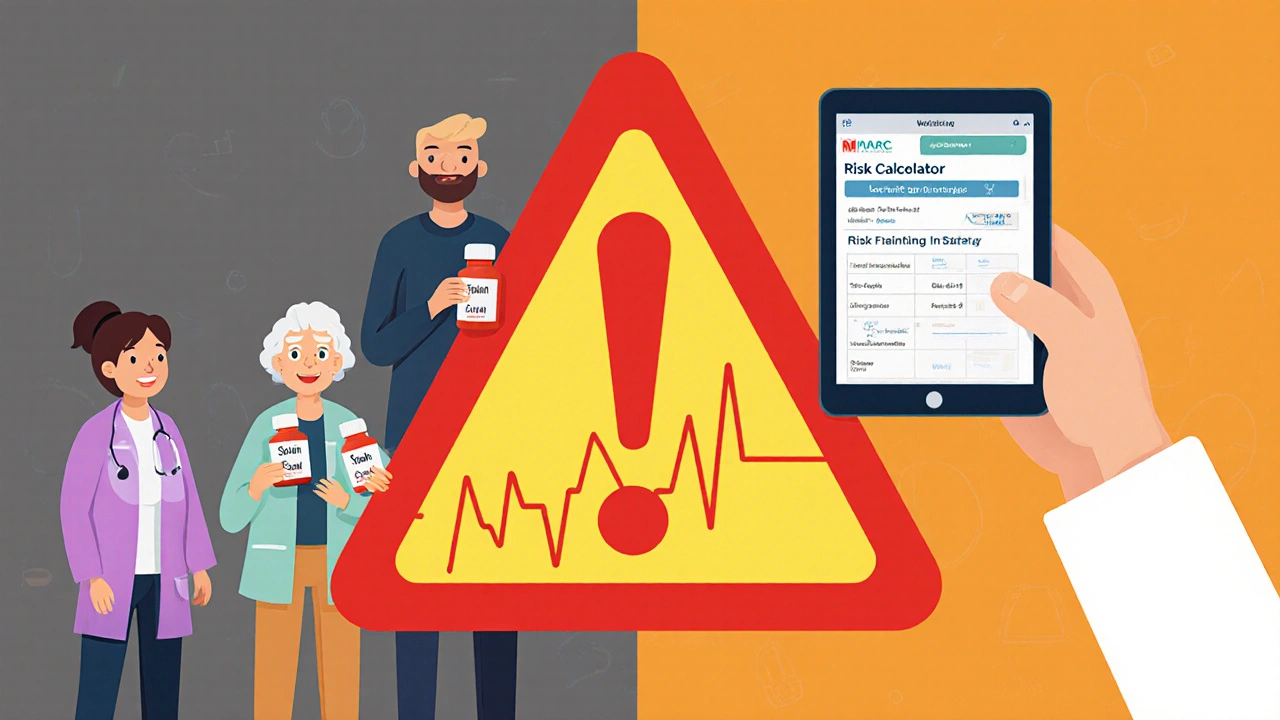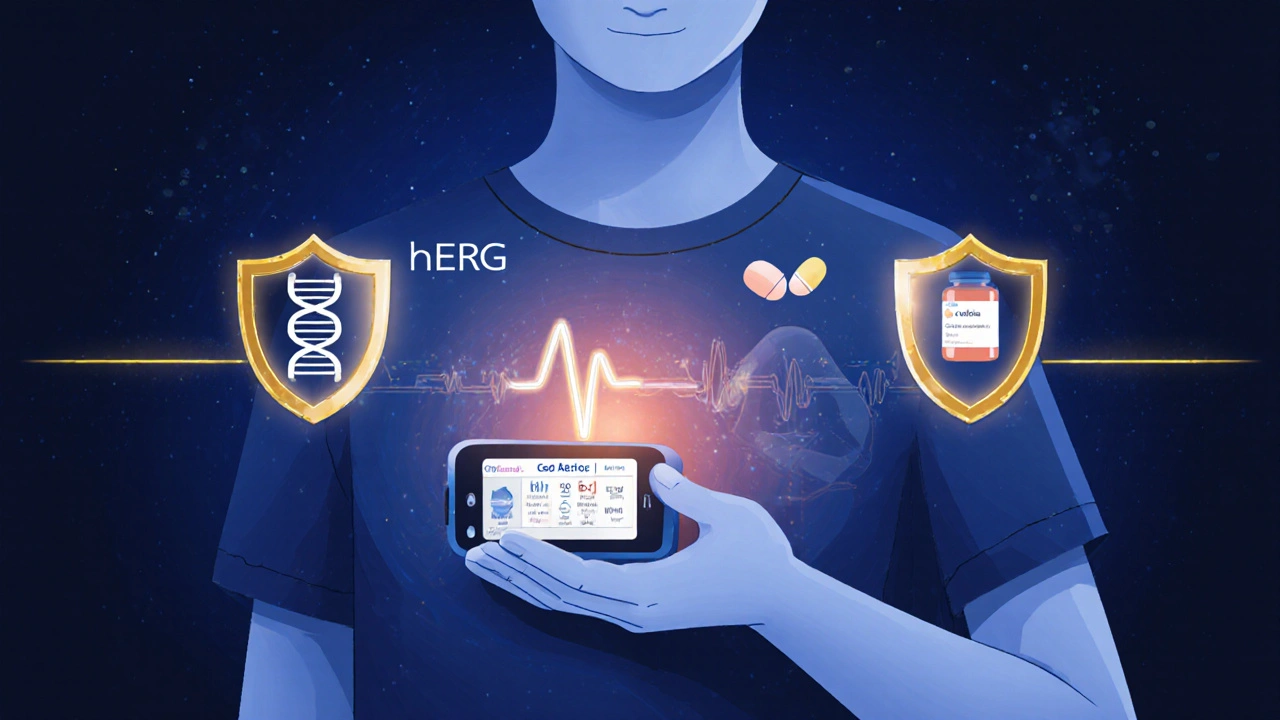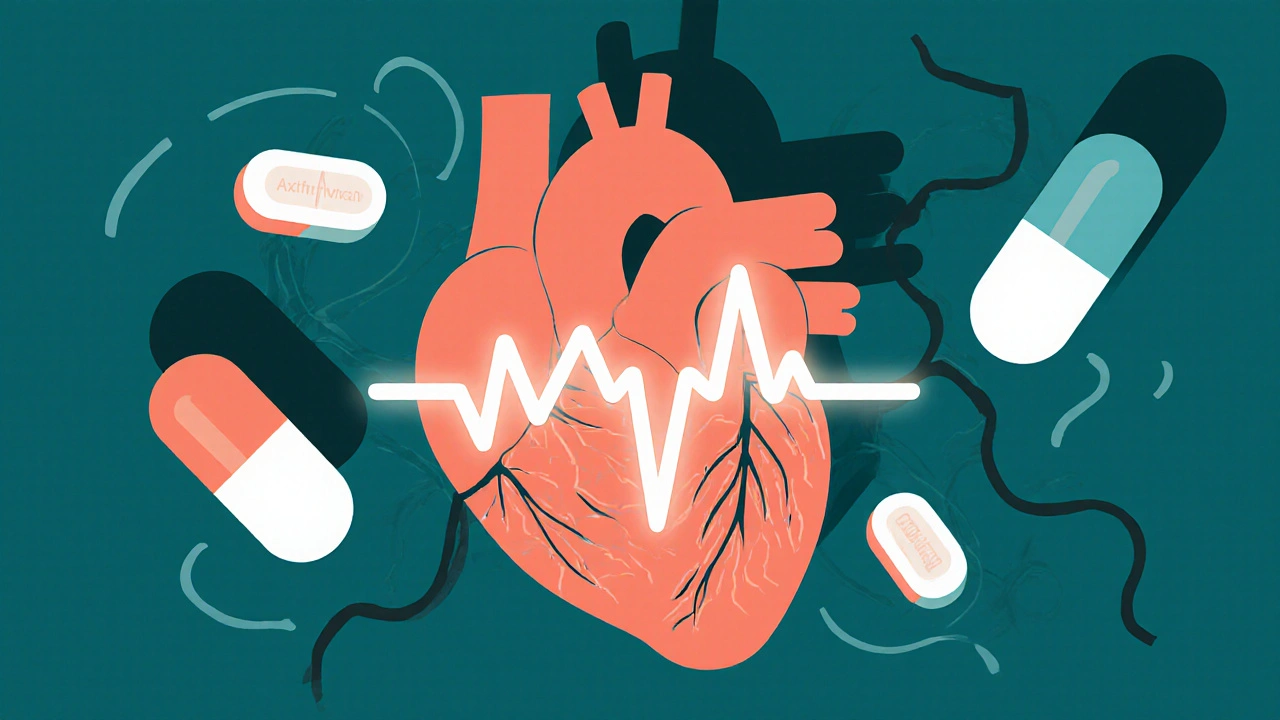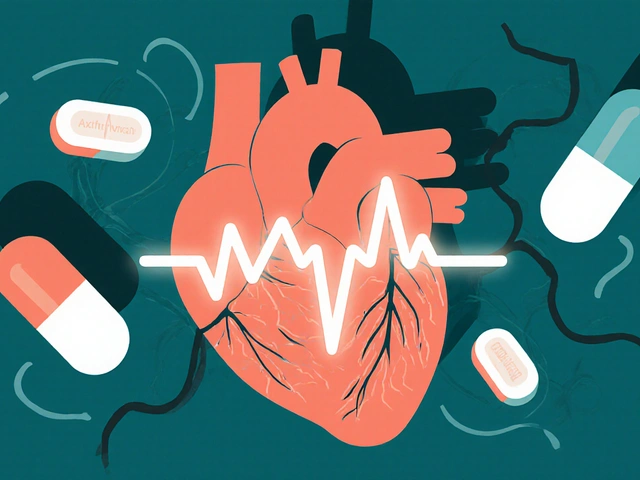Macrolide Arrhythmia Risk Calculator
Personal Risk Assessment
Calculate your personal risk of developing Torsades de pointes when taking macrolide antibiotics based on clinical factors. This tool helps identify if you should discuss safer alternatives with your doctor.
When you take a macrolide antibiotic like azithromycin or clarithromycin for a sinus infection or pneumonia, you’re probably thinking about getting better-not about your heart. But for some people, these common antibiotics can trigger a dangerous electrical disturbance in the heart called QT prolongation, which may lead to a life-threatening rhythm called Torsades de pointes. This isn’t theoretical. It’s documented, measured, and tracked by the FDA, the American Heart Association, and hospitals worldwide. The risk is low for most healthy adults, but it spikes dramatically under certain conditions-and many doctors still don’t talk about it.
What Exactly Is QT Prolongation?
Your heart beats because of electrical signals. The QT interval on an ECG measures how long it takes the heart’s lower chambers (ventricles) to recharge between beats. If that interval stretches too long, the heart can’t reset properly. That’s QT prolongation. It doesn’t cause symptoms on its own. But it creates the perfect setup for Torsades de pointes-a chaotic, fast heart rhythm that can collapse into sudden cardiac arrest. Macrolide antibiotics interfere with a specific potassium channel in heart cells called hERG (human ether-a-go-go-related gene). This channel lets potassium flow out of the cell during repolarization. When macrolides block it, the cell stays electrically charged longer, delaying the heart’s recovery. The result? A longer QT interval on your ECG. Not all macrolides are the same. Clarithromycin is the strongest offender, blocking hERG channels more aggressively than erythromycin. Azithromycin was once thought to be safer because it doesn’t block hERG as strongly and doesn’t interfere much with liver enzymes. But studies show even azithromycin can prolong QT-especially when combined with other drugs or in people with hidden risk factors.Who’s at Real Risk?
The average healthy 30-year-old taking azithromycin for a sore throat is unlikely to have a problem. But if you’re a 72-year-old woman with high blood pressure, taking a diuretic, and have a slightly long QT on your last ECG? That’s a different story. Research identifies six major risk factors that multiply the danger:- Female sex: 68% of all TdP cases occur in women. Hormonal differences affect how heart cells handle potassium.
- Age over 65: Risk doubles. Older hearts have less "repolarization reserve"-less ability to compensate for channel blockage.
- Baseline QTc >450 ms: If your QT is already long, even a small drug effect can push it into danger zone. This happens in 1 in 10 adults without known heart disease.
- Other QT-prolonging drugs: Taking more than one? Risk jumps 1.8 times per extra drug. Common offenders include antidepressants, antifungals, and some anti-nausea meds.
- Low potassium or magnesium: Diuretics, vomiting, or poor diet can drop potassium. Hypokalemia increases TdP risk 3.1-fold.
- Heart failure or structural heart disease: Damaged heart tissue is more electrically unstable. Risk jumps 5.3 times.
And here’s the hidden danger: up to 20% of people who develop TdP after taking macrolides have undiagnosed congenital long QT syndrome. They’ve never had symptoms. Their ECG looked normal. But their heart’s potassium channels are genetically weaker. A single dose of azithromycin was enough to trigger a fatal rhythm.
Clarithromycin vs. Azithromycin: The Real Difference
You’ve probably heard that azithromycin is "safer" than clarithromycin. That’s mostly true-but it’s not the whole story. Clarithromycin is a double threat: it blocks hERG channels strongly and inhibits CYP3A4, a liver enzyme that breaks down many other drugs. That means if you’re on a statin, a blood thinner, or an anti-seizure med, clarithromycin can cause those drugs to build up in your blood-and many of those drugs also prolong QT. The result? A perfect storm. Azithromycin doesn’t interfere with liver enzymes much. But it still blocks hERG. And when researchers looked at 1.3 million prescriptions in the Tennessee Medicaid database, they found a 2.85 excess death rate per 1,000 courses of azithromycin compared to amoxicillin-mostly in the first five days of use. That’s not a big number, but it’s real. And it’s avoidable. The FDA’s labeling reflects this: clarithromycin has a black box warning for QT prolongation. Azithromycin has a warning-but no black box. That’s why doctors still prescribe azithromycin more than 80% of the time. But the label doesn’t tell you if you’re in the 1 in 500 who’s at risk.
When Should You Get an ECG?
You don’t need an ECG before every antibiotic. But if you have two or more risk factors listed above, you should. The American College of Cardiology recommends baseline ECG for patients with:- Age over 65
- Heart failure
- History of arrhythmia
- Use of diuretics or other QT-prolonging drugs
- Known electrolyte imbalances
If your QTc is over 470 ms in men or 480 ms in women, or if it increases by more than 60 ms from a previous ECG, macrolides should be avoided. That’s not a suggestion-it’s a clinical red flag.
And if you’ve ever had unexplained fainting, seizures, or sudden cardiac death in a close relative under age 50? That’s a red flag too. You might have a hidden genetic condition. No ECG is perfect at catching it-but a family history should make your doctor pause before prescribing any QT-prolonging drug.
What Happens If You Already Took It?
If you’ve taken azithromycin or clarithromycin and feel dizzy, lightheaded, or notice your heart racing or skipping beats, stop the medication and get medical help immediately. Don’t wait. Torsades de pointes can come on suddenly-and it can kill in minutes. If you’re on a macrolide and don’t have symptoms, but you’re high-risk, talk to your doctor about switching to a safer antibiotic. Amoxicillin, doxycycline, or cefdinir are often just as effective for respiratory infections-and carry no QT risk. There’s also a new tool gaining traction: the Macrolide Arrhythmia Risk Calculator (MARC). Developed at Brigham and Women’s Hospital, it uses 12 variables-including age, sex, medications, kidney function, and baseline QT-to predict your personal TdP risk with 89% accuracy. It’s not in every clinic yet, but it’s a sign of where things are headed.
What’s Changing in Practice?
The tide is turning. After the FDA’s 2013 requirement that all new antibiotics be tested for QT effects, and the American Heart Association’s 2020 classification of macrolides as "Known Risk" for TdP, prescriptions for clarithromycin dropped 23.5% among Medicare patients in just one year. Hospitals are starting to build alerts into their electronic systems. If you’re flagged as high-risk, your doctor’s computer might pop up a warning before prescribing clarithromycin. Some pharmacies now screen for drug interactions before filling macrolide prescriptions. New tools are emerging too. In 2023, the FDA approved a handheld ECG device called CardioCare QT Monitor that gives automated QTc readings with less than 5 ms error. It’s small, cheap, and could be used in clinics or even at home for high-risk patients. And research is moving toward personalized medicine. Scientists have identified genetic variants in the hERG gene that make some people 4.2 times more sensitive to macrolide-induced QT prolongation. That’s 15% of the population. In the next five years, we may see genetic testing offered before prescribing macrolides to those with family histories of sudden death.What Should You Do?
If you’re prescribed a macrolide antibiotic:- Ask: "Is this the safest option for me?"
- Ask: "Do I have any risk factors for heart rhythm problems?"
- Ask: "Can we check my ECG first?"
- If you’re over 65, on diuretics, or have heart disease-don’t accept "it’s probably fine" as an answer.
- If you’ve had unexplained fainting or family history of sudden cardiac death, tell your doctor-even if you think it’s unrelated.
Antibiotics save lives. But they’re not harmless. The same drug that clears your sinuses could, in rare cases, stop your heart. Knowledge isn’t fear-it’s power. Ask the right questions. Get the right tests. And make sure your care is tailored to your body-not just your infection.
Can azithromycin really cause a heart attack?
Azithromycin doesn’t directly cause heart attacks, but it can trigger Torsades de pointes, a dangerous heart rhythm that can lead to sudden cardiac arrest if not treated immediately. This is rare, but it’s been documented in thousands of cases worldwide, especially in people with other risk factors like low potassium, older age, or existing heart conditions.
Is clarithromycin safer than erythromycin?
No-clarithromycin is actually more dangerous. It blocks the heart’s potassium channels more strongly than erythromycin and also interferes with liver enzymes that break down other medications, increasing the risk of dangerous drug interactions. Both can cause QT prolongation, but clarithromycin carries a black box warning from the FDA for this reason.
Should I avoid macrolides if I have high blood pressure?
High blood pressure alone doesn’t mean you can’t take macrolides. But if you’re also on diuretics (which lower potassium), have heart failure, or are over 65, your risk increases. Talk to your doctor about checking your electrolytes and ECG before starting treatment.
Can I take azithromycin if I’m on a statin?
Avoid azithromycin if you’re on certain statins like simvastatin or lovastatin. While azithromycin doesn’t strongly interfere with liver enzymes, combining it with other QT-prolonging drugs-some statins included-can raise your risk. Ask your pharmacist to check for interactions.
What are the alternatives to macrolides for a sinus infection?
For most sinus infections, amoxicillin is the first-line choice and carries no QT risk. Doxycycline, cefdinir, or amoxicillin-clavulanate are also good alternatives. Macrolides are only needed if you’re allergic to penicillin. Even then, there are non-macrolide options like clindamycin or sulfamethoxazole-trimethoprim.
Is it safe to take azithromycin if I’ve never had heart problems?
For most healthy people under 65 with no other medications or conditions, yes-the risk is very low. But if you’ve ever fainted for no reason, have a family history of sudden death, or take any other prescription drugs, you’re not "just healthy." Always disclose your full medical history to your doctor before taking any antibiotic.



sara styles
November 16, 2025 at 16:49Of course the FDA and Big Pharma don't want you to know this. They've been burying QT prolongation data since the 90s. Azithromycin? A quiet killer disguised as a miracle drug. I've seen it firsthand-my aunt dropped dead after a Z-pack. Autopsy said 'natural causes.' Bullshit. They didn't test her QT interval. They didn't even ask about her diuretics. This isn't medicine-it's corporate negligence wrapped in white coats. And now they're pushing handheld ECG monitors like it's some noble innovation? Nah. They're just trying to shift blame to patients. You think they'd do this if it affected CEOs' kids? Please. The system is rigged, and we're all lab rats in their profit-driven experiment. 🤡
Brendan Peterson
November 17, 2025 at 07:15The data is solid, but the framing is off. Yes, macrolides can prolong QT-but so can coffee, stress, and sleep deprivation. The real issue isn't the antibiotic, it's the lack of baseline screening. We don't check HbA1c before giving steroids, why are we treating QT like some special threat? The risk is real but statistically tiny. Most people who die from TdP had 4+ risk factors and still got the script. The solution isn't fear-it's better protocols. Order an ECG if you're over 65 and on diuretics. Don't panic because a Reddit post scared you.
Rebekah Kryger
November 18, 2025 at 10:36Let’s be real-QT prolongation is just the latest pharmacological boogeyman. We’ve had the same panic over SSRIs, NSAIDs, even decongestants. The hERG channel is a biological vulnerability, not a drug flaw. And yet somehow, azithromycin gets demonized while metformin, which causes lactic acidosis in 1 in 30,000, gets a free pass. It’s not science-it’s selection bias. The FDA’s black box warning? That’s PR, not pharmacology. If we’re going to ban every drug with a QT effect, we’d have to pull half the cardiac meds too. Consistency matters.
Victoria Short
November 18, 2025 at 13:08So… don’t take azithromycin if you’re old and on water pills? Got it. I’ll just ask my doctor next time I have a cough. 😴
Eric Gregorich
November 18, 2025 at 19:48This isn’t just about antibiotics-it’s about the erosion of trust in medicine. We’ve been conditioned to swallow pills like sacraments, blind to the hidden costs. The heart isn’t just a pump; it’s a symphony of ions, channels, and electrical poetry. And when we shove synthetic molecules into that orchestra, we don’t just alter rhythm-we disrupt harmony. Azithromycin isn’t evil. But the system that lets it be prescribed without screening? That’s the real villain. We treat the body like a machine you can upgrade with a prescription, but we forget: it’s alive. It remembers. It sings. And when you silence its song, even for a second, the echo lasts forever.
Rodney Keats
November 18, 2025 at 21:21So let me get this straight-you’re telling me the same drug that’s supposed to cure my sinus infection might also kill me? Cool. So what’s the alternative? Drinking bleach? Because apparently, the only safe antibiotic is the one that doesn’t exist.
Laura-Jade Vaughan
November 19, 2025 at 09:27OMG this is so important!! 💖 I just got a Z-pack last week and I’m 70 and on hydrochlorothiazide and I had no idea!! 😱 I’m booking an ECG tomorrow!! Thank you for sharing this!! 🌸🩺
Jennifer Stephenson
November 20, 2025 at 01:34ECG before macrolides if two or more risk factors. Simple. Effective.
Doctors should do this. Patients should ask.
Done.
Segun Kareem
November 21, 2025 at 17:37In Africa, we don’t have ECG machines in every clinic. But we know this truth: the body speaks if you listen. If your heart stumbles after a pill, don’t ignore it. Ask. Wait. Choose another. Medicine is not just science-it’s respect. Respect for the body’s rhythm, for the silence between beats. This post is a bell. Ring it loud.
Philip Rindom
November 23, 2025 at 15:36Honestly, this is why I love community health forums. I used to think 'antibiotic = quick fix.' Now I know it’s more like a key that fits only certain locks. If I’m over 65 and on a diuretic? I’m gonna ask for amoxicillin. No shame. And if my doc rolls their eyes? I’ll just say, 'I read a Reddit post.' 😅 Thanks for the clarity-this saved me from a dumb mistake.